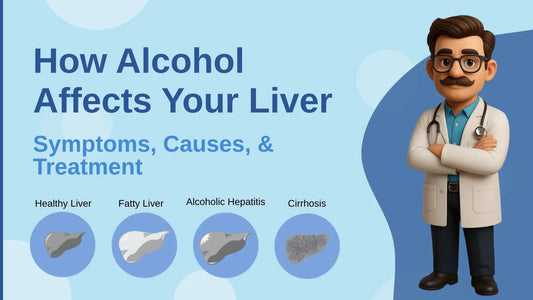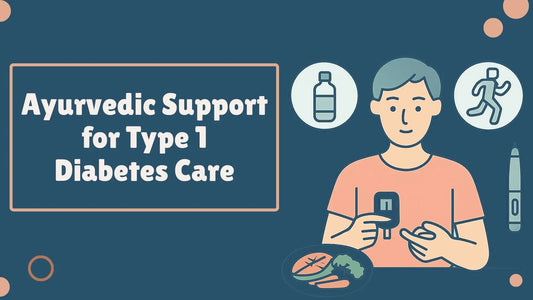
How Alcohol Affects Your Liver: Early Signs, Stages & Ways to Reverse the Damage
Do you consume alcohol occasionally or every weekend? Then this blog is for you, especially. Excessive alcohol consumption is a major global health issue. At first, it affects your liver and its process, which are crucial for our body.
When you drink alcohol, it starts building fat in liver, which results in inflammation and many health conditions. About 35% of heavy drinkers develop advanced liver disease. There are no FDA-approved treatments for alcoholic liver disease, so it's essential to control alcohol consumption.
Let's know more about how alcohol affects your liver when it enters your body and what signs you should watch for protect your liver in the long term.
How liver react after drinking alcohol
Your liver is one of the most crucial organs in your body. It filters toxins, supports digestion, stores energy, and helps your body stay balanced.
After drinking alcohol, the liver instantly starts working to break it down. It uses enzymes like alcohol dehydrogenase (ADH) and aldehyde dehydrogenase (ALDH) to metabolize the alcohol.
But your liver can only process about one standard drink per hour. If you drink more than that, it starts to build up in your bloodstream and make you feel intoxicated.
Over time, this overload leads to serious liver damage such as Fatty Liver, Alcoholic Hepatitis, Cirrhosis, and Hepatic Failure.
The Three Stages of Liver Damage from Alcohol
Your liver doesn't get damaged overnight. It goes through several stages, and here’s where it becomes serious:
Stage 1: Fatty Liver (Steatosis)
Fatty liver is the earliest and most common liver response to excessive alcohol consumption. It is also known as hepatic steatosis. It is a condition where excess fat accumulates in liver cells.
How Fatty Liver Develops
-
Excess Calorie Intake or Alcohol Consumption: The liver breaks down fats, but when overwhelmed by excess alcohol or calories, especially from sugar and saturated fats, it starts storing fat.
-
Impaired Fat Metabolism: Alcohol and insulin resistance (common in obesity and diabetes) impair the liver’s ability to process fat efficiently, leading to fat accumulation.
-
Liver Inflammation: If fat continues to build up, it can trigger inflammation, leading to steatohepatitis (a more serious form of fatty liver).
Can Fatty Liver Be Reversed?
Yes, fatty liver is reversible in its early stages with the right lifestyle changes. Here is how you can reverse it:
-
Stop Alcohol Intake (for Alcoholic Fatty Liver): Complete abstinence allows the liver to heal and reduce fat buildup.
-
Lose Excess Weight: Even a 5–10% reduction in body weight can significantly reduce liver fat.
-
Eat a Liver-Friendly Diet: Focus on healthy liver friendly foods like- fruits, vegetables, whole grains, and healthy fats (like omega-3s). Avoid sugar, refined carbs, processed foods, and saturated fats.
-
Manage Underlying Health Conditions: Control diabetes, cholesterol, and high blood pressure, if present.
Stage 2: Alcoholic Hepatitis
Alcoholic Hepatitis is an inflammatory condition of the liver caused due to prolonged and excessive alcohol consumption. It doesn’t develop overnight, it’s a result of years of heavy drinking. Although in some cases, binge drinking over a short period can also develop it.
How Alcoholic Hepatitis Develops
-
Toxic Effects of Alcohol: When the liver breaks down alcohol, it produces harmful byproducts like acetaldehyde. These substances damage liver cells and create oxidative stress.
-
Inflammatory Response: The damaged liver cells release signals that trigger inflammation. This inflammation is the body’s response to injury, but it ends up worsening liver damage.
-
Fat Accumulation and Immune Reaction: Alcohol also promotes fat buildup in the liver (steatosis), which, combined with inflammation, leads to alcoholic hepatitis.
-
Progression to Fibrosis or Cirrhosis: Over time, repeated injury and inflammation cause scar tissue (fibrosis) to form. If this continues, it can lead to cirrhosis and permanent liver damage.
Can Alcoholic Hepatitis Be Reversed?
Yes, in its early or moderate stages, alcoholic hepatitis can be managed and even reversed with proper care. However, severe or advanced cases may cause permanent liver damage and require more intensive treatment. Steps to Reverse it:
-
Complete Alcohol Abstinence: The most crucial and non-negotiable step. Quitting alcohol stops ongoing damage and allows the liver to heal.
-
Nutritional Therapy: Malnutrition is common in alcoholic hepatitis. A high-protein, high-calorie diet with vitamins (especially B-complex, folate, and vitamin A) supports healing.
-
Medical Treatment: Corticosteroids may reduce liver inflammation in severe cases. Pentoxifylline is sometimes used to lower the risk of kidney failure.
-
Hydration and Electrolyte Balance: Maintaining fluid and mineral balance is important, especially in hospitalized patients.
-
Treatment of Complications: Any signs of infection, bleeding, or liver/kidney failure require immediate medical intervention.
-
Liver Transplant: In life-threatening cases where liver failure has occurred, a transplant may be considered. However, most transplant centers require a minimum of 6 months of sobriety.
Stage 3: Cirrhosis
Cirrhosis develops over time when the liver is constantly injured from alcohol, viral infections, fatty liver disease, or toxins. In response, the liver tries to repair itself. But repeated damage results in scar tissue replacing healthy tissue.
This scarring:
-
Disrupts normal liver function
-
Blocks blood flow through the liver
-
Affects how the liver filters toxins, makes proteins, and stores nutrients
Can Cirrhosis Be Reversed?
If cirrhosis is diagnosed early, and the underlying cause is removed or treated, the liver can partially heal. This means:
-
The scarring may not go away completely
-
But liver function can improve significantly
-
Further progression can be stopped or slowed down
Advanced Cirrhosis: Permanent Damage
In later stages (especially when complications like portal hypertension, ascites, or liver failure occur), the scarring is extensive and permanent.
At this point:
-
The liver cannot regenerate the lost healthy tissue
-
Damage is not reversible, but treatment can still prevent further decline
-
A liver transplant may become necessary in end-stage cirrhosis
How to Manage and Slow Down Cirrhosis
Even if you can’t reverse all the damage, you can stop it from getting worse. Here's how:
1. Stop Alcohol Completely:
Alcohol is toxic to liver cells. If alcohol is the cause, quitting it entirely is the most important step toward healing.
2. Treat the Root Cause
-
Hepatitis B or C: Can be treated with antiviral medications
-
Fatty Liver Disease (NAFLD/NASH): Improved with weight loss, exercise, and controlling diabetes
-
Autoimmune Hepatitis: Treated with steroids and immune-suppressing medications
3. Eat a Liver-Friendly Diet:
Low sodium (to reduce fluid retention), Rich in fruits, vegetables, and whole grains, Avoid processed food, sugar, and unhealthy fats, Limit red meat and saturated fats
4. Avoid Unnecessary Medications:
Some drugs (like painkillers, steroids, or herbal supplements) can worsen liver function.
5. Regular Medical Follow-Up:
Routine checkups, imaging, and liver function tests help track progress and catch complications early.
When to See a Doctor
You should see a doctor if you experience any of the following signs and symptoms, especially if you consume alcohol regularly:
-
Persistent fatigue or weakness
-
Loss of appetite or unexplained weight loss
-
Yellowing of the skin or eyes (jaundice)
-
Swelling in your legs, ankles, or abdomen
-
Pain or discomfort in the upper right side of your abdomen
-
Nausea, vomiting, or confusion
-
Dark-colored urine or pale stools
-
Easy bruising or bleeding
Early detection can help prevent further liver damage. If you're struggling to reduce or stop alcohol consumption, seeking medical support is strongly recommended.
Final Thoughts
Your liver is your body’s detox powerhouse. But it also has limits. If you're drinking more than recommended, especially regularly, then take a pause and think about your liver. It won’t send you a warning right away, but once it does, it might be too late.
The good news? It’s never too early to cut back, make changes, and show your liver some care.
References
- UCF College of Medicine. (June 6, 2024). UCF physicians find alternative treatment option for alcohol-related liver disease. UCF Population Health News. Retrieved from: https://www.ucf.edu/news/ucf-physicians-find-alternative-treatment-option-for-alcohol-related-liver-disease
- U.S. Food and Drug Administration. (March 14, 2024). FDA approves first treatment for patients with liver scarring due to fatty liver disease. Retrieved from: https://www.fda.gov/news-events/press-announcements/fda-approves-first-treatment-patients-liver-scarring-due-fatty-liver-disease
- Hyun, J., Han, J., Lee, C., Yoon, M., & Jung, Y. (2021). Pathophysiological aspects of alcohol metabolism in the liver. International Journal of Molecular Sciences, 22(11), 5717. Retrieved from: https://www.mdpi.com/1422-0067/22/11/5717
- Zakhari, S. (2006). Overview: How is alcohol metabolized by the body? Alcohol Research & Health, 29(4), 245–254. Retrieved from: https://pmc.ncbi.nlm.nih.gov/articles/PMC6527027/
- Osna, N. A., Donohue Jr, T. M., & Kharbanda, K. K. (2017). Alcoholic liver disease: Pathogenesis and current management. Alcohol Research: Current Reviews, 38(2), 147–161. PMID: 28988570. Retrieved from: https://pubmed.ncbi.nlm.nih.gov/28988570/

Dr. Hindika Bhagat
Dr. Hindika is a well-known Ayurvedacharya who has been serving people for more than 7 years. She is a General physician with a BAMS degree, who focuses on controlling addiction, managing stress and immunity issues, lung and liver problems. She works on promoting herbal medicine along with healthy diet and lifestyle modification.



